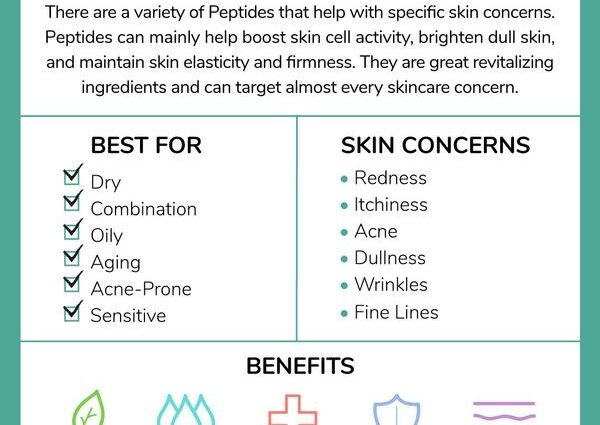Contents
Peptides: molecules with anti-aging benefits?
The tissues of the body contain peptides in large quantities, at least for a part of the life. Their decrease partly explains aging. But we manufacture substances very close to their natural components to overcome their deficit.
Understanding aging
Before looking at peptides, we must briefly recall how we age if we do not know why. Over time, the production of two primordial molecules decreases:
- That of collagen decreases from the age of 30 by 1,5% per year; collagen represents 80% of the skin at age 30;
- That of elastin stops at puberty. At 45, the body has 5 times less than at puberty.
The effects of decreasing collagen and elastin reserves lead to sagging skin. It loses its firmness and density and gains fine lines and wrinkles.
These two molecules have different properties:
- Collagen exists in three forms. Forms I and III are made by fibroblasts (connective tissue cells) and osteoblasts (bone tissue cells). Type II collagen is made by chondrocytes (cells in cartilage tissue). It is inextensible. The more the skin contains, the firmer it is. Besides, the word comes from the Greek Kola for glue. The body contains 30% of it: bones, tendons, ligaments, skin, connective tissue, hair, nails;
- Elastin is secreted by fibroblasts in the dermis. It is stretchy and gives the skin its elasticity. It does not renew after puberty.
We understand better that aging gradually affects the whole body, as evidenced by stiffness, pain, rheumatism and the appearance of the skin. Bad news. But the good news is that it can be fixed, well… in part.
Peptides, a little chemistry
Peptides are chains of amino acids. We are talking about :
- Peptide when there are less than 10 amino acids in the chain;
- Polypeptide or protein when there are more than 10;
- There can be up to 100 amino acids per chain.
These small proteins are very active in skin biological processes, such as inflammation, cell proliferation, melanogenesis (melanin gives the skin its color). They modify the activity of cells to better arm the different tissues against attacks and free radicals (responsible for oxidation).
We can makeuer peptides, then called “synthetic”, very similar to natural peptides. They are short chain peptides of 2 to 10 amino acids. Their name is a bit off-putting. The name of the molecule + the number of amino acids + a number.
For example: Palmitoyl (the molecule) tetrapeptide (4 amino acids) and the number 7. This gives Palmytoyl tetrapeptide-7.
Powerful cellular activity
Peptides have common properties and specific properties depending on their formula.
Common properties:
- Stimulation of collagen synthesis by fibroblasts and those of hyaluronic acid and elastin;
- Skin care and protection;
- Anti-oxidation;
- Hydration;
- Improvement of capillary vessels.
The particular properties:
- Hexapeptides-2 promotes tanning before or during sun exposure by increasing melanin synthesis;
- Others, on the contrary, have a brightening effect on hyperpigmented areas;
- Others have a soothing effect (such as Palmitoyls tetrapeptides-7 or Acetyls tetrapeptides-15);
- Neurosensin is anti-inflammatory;
- A final example: some increase the production of keratin to repair the capillaries or the epidermis.
Peptides that spread
Peptides are found in creams and serums. The serums are richer (better concentration) and their penetration through the skin faster. You still have to be patient because the results are obtained in 3 to 4 weeks. It must also be applied and determined because it is necessary to repeat the application at least once a day and more if possible. The skin regains its density, wrinkles and fine lines are reduced. Remember that peptides activate tanning and neutralize free radicals. Finally, we obtain a radiant “healthy glow” effect. Return to youth: anti-aging effect.
Peptides that are drunk or eaten
The Internet lists all kinds of peptides that are contained in drink bottles or food supplements. These are products of animal origin and vegetarians will look at the leaflets very carefully. We generally offer 20g of peptides per serving.
We understand that in view of the peptide deficit which settles throughout life and which concerns so many human tissues (the skin in particular but all the connective tissue of the body), it is wise to think of restoring the organism to at least mitigate the all-out consequences of aging.










